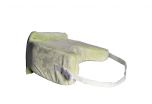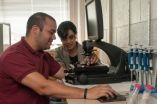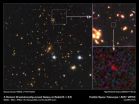DENVER, CO, September 20, 2012 (Press-News.org) The Sweet Oasis nursing pillow, designed to help mothers nurse more comfortably, is now available via the web and in select baby boutiques throughout the Denver area.
Designed by a breastfeeding mom, the Sweet Oasis pillow makes nursing more comfortable for mother and baby by ergonomic and secure positioning every feeding. The Sweet Oasis nursing pillow's patent-pending design, intended for nursing or bottle-feeding on the caregiver's lap, aligns baby in a healthy, inclined position; provides greater stability and safety; and washes and carries easily.
Mother and teacher Jane Kelly took the idea from concept to reality over three years, during which she conducted extensive research, prototyping and testing with the help of mothers and lactation consultants.
The incline of the pillow is an important design feature, providing positioning to aid natural digestion and reduce reflux, and the height is designed to lift the baby to the breast so that mom doesn't have to strain. The unique outer ridge creates a steadier and more secure pillow. High-density foam provides softness and firmness, and a super-soft cover feels wonderful next to baby's delicate skin.
Lactation consultants say that the Sweet Oasis nursing pillow's simple yet effective design follows best practices for nursing.
The pillow, which retails for $49.99, launched via the Sweet Oasis website (www.sweetoasispillow.com), and is also available in several baby boutiques, and on Amazon.com. Visit the Sweet Oasis website for a complete list of retail outlets.
For more information, please contact:
Jane Kelly, Designer and Owner
contact@sweetoasispillow.com
(303) 669-6548
www.sweetoasispillow.com
Ergonomic Nursing Pillow with Innovative Features Benefits New Moms
After three years of research and development, the mom-designed Sweet Oasis nursing pillow is available through select retailers and its website www.sweetoasispillow.com.
2012-09-20
ELSE PRESS RELEASES FROM THIS DATE:
Genetic mutation may have allowed early humans to migrate throughout Africa, research says
2012-09-20
WINSTON-SALEM, N.C. – Sept. 19, 2012 – A genetic mutation that occurred thousands of years ago might be the answer to how early humans were able to move from central Africa and across the continent in what has been called "the great expansion," according to new research from Wake Forest Baptist Medical Center.
By analyzing genetic sequence variation patterns in different populations around the world, three teams of scientists from Wake Forest Baptist, Johns Hopkins University School of Medicine and the University of Washington School of Medicine, Seattle, demonstrated ...
Clemson psychology professor conducts sleep research at Vienna university
2012-09-20
CLEMSON — Clemson University psychology professor June Pilcher returned recently from Austria, where she worked with University of Vienna researchers to study ways college students' sleep habits affect how they function socially.
Pilcher received a Fulbright-Freud Award to work with the Social, Cognitive, Affective and Neuroscience Unit (SCAN) at the University of Vienna. She also worked with the Sigmund Freud Museum, giving a series of talks and lectures.
Pilcher participated in research with the university's SCAN unit, a center that conducts research in the fields ...
Satellite sees post-Tropical Cyclone Lane fizzle in a blanket of low clouds
2012-09-20
Former Hurricane Lane has fizzled and its remnant circulation was spotted in a blanket of low clouds in the Eastern Pacific Ocean.
NOAA's GOES-15 satellite sits in a fixed orbit over the western U.S. and captures continuous visible and infrared imagery of the western U.S. and the Eastern Pacific Ocean. On Sept. 19 at 11:45 a.m. EDT, GOES-15 captured a visible image of post-tropical Lane's remnants that appear as a small circulation center. The center was located over 1,000 miles from Baja California in an extensive field of stratocumulus clouds. Stratocumulus clouds are ...
Evolution is as complicated as 1-2-3
2012-09-20
EAST LANSING, Mich. — A team of researchers at Michigan State University has documented the step-by-step process in which organisms evolve new functions.
The results, published in the current issue of Nature, are revealed through an in-depth, genomics-based analysis that decodes how E. coli bacteria figured out how to supplement a traditional diet of glucose with an extra course of citrate.
"It's pretty nifty to see a new biological function evolve," said Zachary Blount, postdoctoral researcher in MSU's BEACON Center for the Study of Evolution in Action. "The first ...
Study shows how consumers shift expectations and goals
2012-09-20
NEW YORK - September 19, 2012 - Sally and Harry are about to invest in their company's 401(k) plan. Sally chooses the best performing mutual fund, which has high risks but boasts a 25 percent year-to-date return. Harry, after considering the tradeoffs between risks and rewards, opts for a lower performing fund with an 8 percent year-to-date return. When they receive their next quarterly performance reports, both Sally and Harry discover that their funds have met their initial expectations. Are they satisfied? If not, why? And how could their levels of satisfaction be improved?
One ...
Using a laser to 'see' the smallest world
2012-09-20
(Santa Barbara, Calif.) –– A multi-university team has employed a high-powered laser based at UC Santa Barbara to dramatically improve one of the tools scientists use to study the world at the atomic level. The team used their amped-up electron paramagnetic resonance (EPR) spectrometer to study the electron spin of free radicals and nitrogen atoms trapped inside a diamond.
The improvement will pull back the veil that shrouds the molecular world, allowing scientists to study tiny molecules at a high resolution.
The team, which includes researchers from UCSB, University ...
UGA researchers boost efficacy of drugs by using nanoparticles to target 'powerhouse of cells'
2012-09-20
Athens, Ga. - Nanoparticles have shown great promise in the targeted delivery of drugs to cells, but researchers at the University of Georgia have refined the drug delivery process further by using nanoparticles to deliver drugs to a specific organelle within cells.
By targeting mitochondria, often called "the powerhouse of cells," the researchers increased the effectiveness of mitochondria-acting therapeutics used to treat cancer, Alzheimer's disease and obesity in studies conducted with cultured cells.
"The mitochondrion is a complex organelle that is very difficult ...
Johns Hopkins astrophysicist spies ultra-distant galaxy amidst cosmic 'dark ages'
2012-09-20
With the combined power of NASA's Spitzer and Hubble space telescopes as well as a cosmic magnification effect, a team of astronomers led by Wei Zheng of The Johns Hopkins University has spotted what could be the most distant galaxy ever detected.
Light from the young galaxy captured by the orbiting observatories shone forth when the 13.7-billion-year-old universe was just 500 million years old.
The far-off galaxy existed within an important era when the universe began to transit from the so-called "Dark Ages." During this period, the universe went from a dark, starless ...
The 'slippery slope to slime': Overgrown algae causing coral reef declines
2012-09-20
CORVALLIS, Ore. – Researchers at Oregon State University for the first time have confirmed some of the mechanisms by which overfishing and nitrate pollution can help destroy coral reefs – it appears they allow an overgrowth of algae that can bring with it unwanted pathogens, choke off oxygen and disrupt helpful bacteria.
These "macroalgae," or large algal species, are big enough to essentially smother corals. They can get out of control when sewage increases nitrate levels, feeds the algae, and some of the large fish that are most effective at reducing the algal buildup ...
The key to cooperation? Think fast
2012-09-20
It's an age old question: Why do we do good? What makes people sometimes willing to put "We" ahead of "Me?" Perhaps our first impulse is to be selfish, and cooperation is all about reining in greed. Or maybe cooperation happens spontaneously, and too much thinking gets in the way.
Harvard scientists are getting closer to an answer, showing that people's first response is to cooperate and that stopping to think encourages selfishness.
David Rand, a Post-Doctoral Fellow in Psychology, Joshua Greene, the John and Ruth Hazel Associate Professor of the Social Sciences ...
LAST 30 PRESS RELEASES:
Scientists deliver new molecule for getting DNA into cells
Study reveals insights about brain regions linked to OCD, informing potential treatments
Does ocean saltiness influence El Niño?
2026 Young Investigators: ONR celebrates new talent tackling warfighter challenges
Genetics help explain who gets the ‘telltale tingle’ from music, art and literature
Many Americans misunderstand medical aid in dying laws
Researchers publish landmark infectious disease study in ‘Science’
New NSF award supports innovative role-playing game approach to strengthening research security in academia
Kumar named to ACMA Emerging Leaders Program for 2026
AI language models could transform aquatic environmental risk assessment
New isotope tools reveal hidden pathways reshaping the global nitrogen cycle
Study reveals how antibiotic structure controls removal from water using biochar
Why chronic pain lasts longer in women: Immune cells offer clues
Toxic exposure creates epigenetic disease risk over 20 generations
More time spent on social media linked to steroid use intentions among boys and men
New study suggests a “kick it while it’s down” approach to cancer treatment could improve cure rates
Milken Institute, Ann Theodore Foundation launch new grant to support clinical trial for potential sarcoidosis treatment
New strategies boost effectiveness of CAR-NK therapy against cancer
Study: Adolescent cannabis use linked to doubling risk of psychotic and bipolar disorders
Invisible harms: drug-related deaths spike after hurricanes and tropical storms
Adolescent cannabis use and risk of psychotic, bipolar, depressive, and anxiety disorders
Anxiety, depression, and care barriers in adults with intellectual and developmental disabilities
Study: Anxiety, gloom often accompany intellectual deficits
Massage Therapy Foundation awards $300,000 research grant to the University of Denver
Gastrointestinal toxicity linked to targeted cancer therapies in the United States
Countdown to the Bial Award in Biomedicine 2025
Blood marker from dementia research could help track aging across the animal world
Birds change altitude to survive epic journeys across deserts and seas
Here's why you need a backup for the map on your phone
ACS Central Science | Researchers from Insilico Medicine and Lilly publish foundational vision for fully autonomous “Prompt-to-Drug” pharmaceutical R&D
[Press-News.org] Ergonomic Nursing Pillow with Innovative Features Benefits New MomsAfter three years of research and development, the mom-designed Sweet Oasis nursing pillow is available through select retailers and its website www.sweetoasispillow.com.








